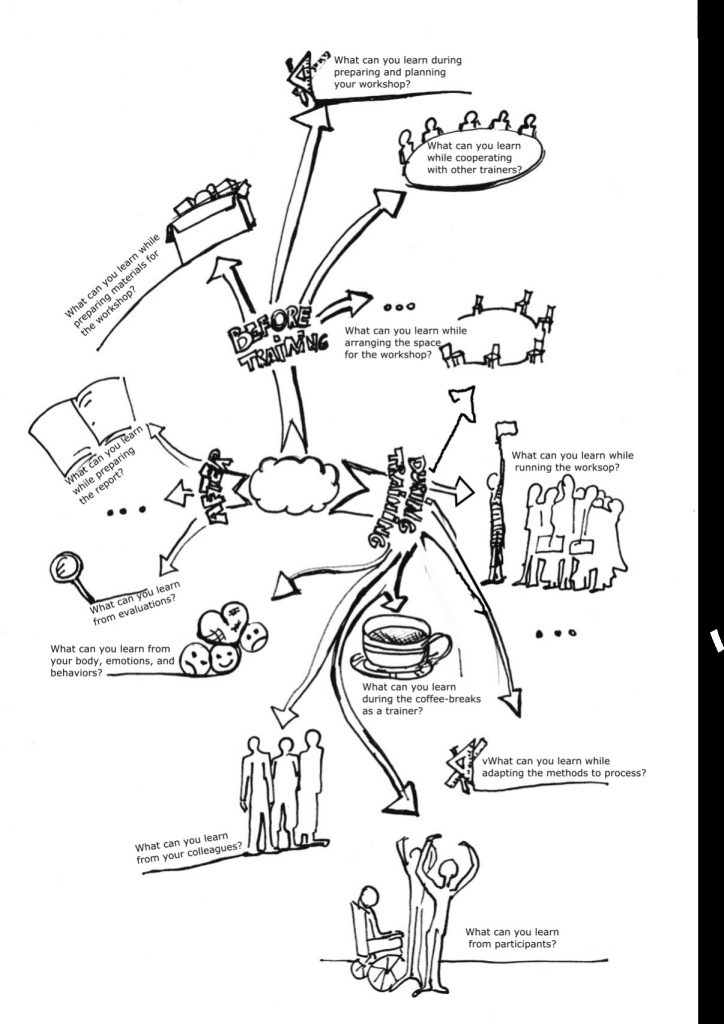Learning opportunities during the training
In this article we would like to inspire you to map out different learning opportunities during the training.

Why did I choose this tool?
Sometimes we as trainers are not aware how much we can learn during our work. Each deal matters. Take a look at the visual mind-map below and add the missing areas; I guess there are many more.
How does it apply to being a trainer?
Being a trainer during a seminar may be a great chance for experiential learning. We could even consider this experience to be the main tool for trainers’ professional development.
Content:
Seminar—the experiential learning field for a trainer.
Experiential learning was first introduced as a concept by Kolb in his book Experiential Learning (Kolb, 1984) which had a huge impact on learning theories and methodological approaches in formal education. It emphasizes the power of experience as a way of learning.
Kolb in his book refers only to cognitive learning. With decades of practice, researchers reframed experiential learning and gave it a much wider and holistic understanding.
Weil and McGill (1989) described 4 areas where experiential learning could happen:
“Village One is concerned particularly with assessing and accrediting learning from life and work experience as the basis for creating new routes into higher education, employment and training opportunities, and professional bodies.
Village Two focuses on experiential learning as the basis for bringing about change in the structures, purposes and curricula of post-school education.
Village Three emphasizes experiential learning as the basis for group consciousness raising, community action and social change.
Village Four is concerned with personal growth and development and experiential learning approaches that increase self-awareness and group effectiveness.” (Wilson and Hayes, 2000, p.75)
David Boud (1989) pointed out three teaching approaches within Experiential Learning, namely
1. ’the individual-centred approach’,
2. ‘the group-centred approach’,
3. ‘the project-centred approach’ (Illeris, 2017, pp.131).
This discourse leads us to an understanding that each singular training might be a learning experience for a trainer, leading him/her to very concrete outcomes through the individual-centered, as well as project-centered approach from the first village.
Exercise:
Answer the questions from the following illustration:

Questions from the mind map:
Before the training:
- What can you learn during preparing and planning your workshop?
—— How can you learn this? - What can you learn while cooperating with other trainers?
—— How can you learn this? - What can you learn during preparing materials for the workshop?
—— How can you learn this?
During the training:
- What can you learn while arranging the space for the workshop?
____How can you learn this? - What can you learn while running the workshop?
—— How can you learn this? - What can you learn during the coffee-breaks as a trainer?
—— How can you learn this? - What can you learn while adapting methods to the process?
—— How can you learn this? - What can you learn from your colleagues?
—— How can you learn this? - What can you learn from the participants?
—— How can you learn this? - What can you learn from your body, emotions and behavior?
—— How can you learn this?
After the training:
- What can you learn while preparing the report?
—— How can you learn this? - What can you learn while analyzing the evaluation?
—— How can you learn this? - What can you learn from looking at the whole process?
—— How can you learn this?
Reflection questions:
- How to manage meta reflection during the training?
- Who can support you in this?
- Do you have a way to record your performance during a training?
- How would you know you did well?




